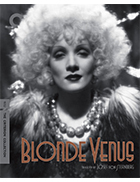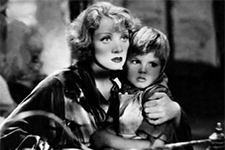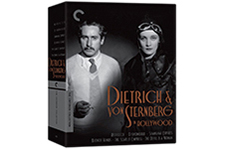| Director: Josef von Sternberg | | Screenplay: Jules Furthman and S.K. Lauren | | Stars: Marlene Dietrich (Helen Faraday), Herbert Marshall (Edward “Ned” Faraday), Cary Grant (Nick Townsend), Dickie Moore (Johnny Faraday), Gene Morgan (Ben Smith), Rita La Roy (Taxi Belle Hooper), Robert Emmett O’Connor (Dan O’Connor), Sidney Toler (Detective Wilson), Morgan Wallace (Dr. Pierce) | | MPAA Rating: NR | | Year of Release: 1932 | | Country: U.S. |  |
|  Blonde Venus, the fourth of the six films that director Josef von Sternberg made with his star and muse Marlene Dietrich, is simultaneously the most conventional and the most over-the-top. Of all the films they made together, it is the one that hews most closely to the conventional melodrama, with its story about a devoted wife who pays for her dying husband to get medical treatment by getting involved with a millionaire playboy and pays the price. Of course, because this is a von Sternberg film with Dietrich in the lead role, you can be assured that it will be anything but typical, although its framing of conventional melodramatic narrative beats with excessive visual style doesn’t always work, making it feel at times like a fractured work, one with two personalities working against each other. The story begins in grand pre-Code fashion, with a group of young female dancers in Germany swimming naked in a secluded pond and being discovered by a group of male, mostly American students, who of course stop to take in the view. One of the swimmers is Helen (Dietrich), who catches the eye of one of the more gregarious students, Ned Faraday (Herbert Marshall). We then leap ahead a number of years later where we find Ned and Helen happily married and raising a precious five-year-old son, Johnny (perennial child star Dickie Moore). However, all is not well, as Ned, who works as a chemist, has been poisoned by radium and is dying. He attempts to sell his body to science, knowing that he will soon be dead, but then discovers that there is a possible cure, albeit one that is lengthy and expensive and must be done in Europe. To pay for the treatment, Helen decides to go back to work singing at nightclubs, something that Ned is against, but allows because he realizes that otherwise there is no chance that he will be cured. Helen soon attracts the attention of Nick Townsend (Cary Grant), a millionaire politician-playboy. He gives her enough money to send Ned to Europe to begin his treatment, and soon puts her and Johnny up in a “friend’s apartment” so she doesn’t have to work at the nightclub anymore. It isn’t long before Helen and Nick become romantically and sexually involved, which fills her with all manner of guilt months later when Ned returns. Unfortunately, Ned returns earlier than planned and can’t find Helen because she is on vacation with Nick, which forces her to come clean about what she has been doing in his absence. She feels compelled to return to Ned even though she loves Nick, which sets up an impossible love triangle borne out of her simultaneous devotion to her husband and weakness when confronted with Nick’s charms, money, and lavish lifestyle. In this regard, Helen is one of Dietrich’s more complex female martyrs, in that she essentially sacrifices herself for her husband—literally purchasing his life with her allure—and is then brutally punished for her transgressions. Ever the dedicated mother, she attempts to run away with Johnny when Ned threatens to take him, but she is eventually caught and must give him up, which leads her to bury the past in a new life of cabaret singing in Paris. The circularity of the narrative is a given, and that she will again cross paths with Nick and Ned and find some kind of resolution in the final reel should surprise no one. The screenplay by veteran scribe Jules Furthman (who also had a hand in von Sternberg’s Morocco and Shanghai Express) and S.K. Lauren (who would later contribute to von Sternberg’s 1935 adaptation of Crime and Punishment) is not particularly original and lacks some of the better, saucy dialogue that characterized von Sternberg’s previous Dietrich films. For the most part, Blonde Venus, despite the salacious title, takes itself all to seriously. That is not to say that there isn’t plenty of jaunty camp appeal to be found, it’s just that it’s all contained in stand-alone sequences that feel at odds with the tone of the rest of the film. Von Sternberg breaks up the melodrama with a number of length musical numbers that allow Dietrich to strut what initially made her famous in The Blue Angel (1930) and Morocco (1931), and Blonde Venus’s highpoint may very well be “Hot Voodoo,” a salacious number that begins with Dietrich dressed as an ape and ends with her making eyes with Cary Grant. Von Sternberg, cinematographer Bert Glennon (who later became a favorite of John Ford’s, shooting his 1939 classics Young Mr. Lincoln and Stagecoach), and art director Wiard Ihnen (who was married to famed costume designer Edith Head) pour on all of the director’s trademark visuals, including lace curtains, fluid camerawork, and extreme density in the set design, but the film as a whole feels too fractured, too messy, too at odds with its own intentions to really work as either pure drama or utter camp. | Blonde Venus Criterion Collection Blu-ray |  Blonde Venus is available exclusively as part of the Criterion Collection’s “Dietrich & Von Sternberg in Hollywood” boxset, which also includes Morocco (1930), Dishonored (1931), Shanghai Express (1932), The Scarlet Empress (1934), and The Devil Is a Woman (1935). Blonde Venus is available exclusively as part of the Criterion Collection’s “Dietrich & Von Sternberg in Hollywood” boxset, which also includes Morocco (1930), Dishonored (1931), Shanghai Express (1932), The Scarlet Empress (1934), and The Devil Is a Woman (1935). | | Aspect Ratio | 1.37:1 | | Audio | English Linear PCM 1.0 monaural | | Subtitles | English | | Supplements | New interviews with film scholars Janet Bergstrom and Homay King; director Josef von Sternberg’s son, Nicholas; Deutsche Kinemathek curator Silke Ronneburg; and costume designer and historian Deborah Nadoolman LandisNew documentary about actor Marlene Dietrich’s German origins, featuring film scholars Gerd Gemünden and Noah IsenbergNew documentary on Dietrich’s status as a feminist icon, featuring film scholars Mary Desjardins, Amy Lawrence, and Patricia WhiteThe Legionnaire and the Lady, a 1936 Lux Radio Theatre adaptation of Morocco, featuring Dietrich and actor Clark GableNew video essay by critics Cristina Álvarez López and Adrian MartinThe Fashion Side of Hollywood, a 1935 publicity short featuring Dietrich and costume designer Travis BantonTelevision interview with Dietrich from 1971Insert book featuring essays by critics Imogen Sara Smith, Gary Giddins, and Farran Smith Nehme | | Distributor | The Criterion Collection | | SRP | $124.95 | | Release Date | July 3, 2018 | | | COMMENTS | | Calling Criterion’s Dietrich & Von Sternberg in Hollywood a major release doesn’t quite do it justice, as the set pulls together six major films that represent the near entirety of one of the most important, fascinating, and influential director-actor collaborations in film history. Not only does the Criterion boxset include all six of the films Marlene Dietrich and Josef von Sternberg made together during their years working for Paramount (the only exclusion is 1930’s The Blue Angel, which was a German production distributed in the U.S. by Paramount), but there is a host of extras that contextualize the films historically and aesthetically and help us better appreciate the artistry of Dietrich and von Sternberg. In terms of sound and image, all six films are in the best condition they’ve ever been in on home video. Given that all of the films were made between 1930 and 1935, they certainly reflect the style and quality of filmstock, cameras, and sound recording technologies at that time, which is how it should be. Morocco and Dishonored, both of which were early synchronized sound films, are both presented in their proper 1.19:1 aspect ratio, which reflects the compromise made at the time to use the silent-era parameters of 35mm film stock and take away from of the image to make room for the optical soundtrack. The other four films are presented in their 1.33:1 or 1.37:1 Academy aspect ratio. Morocco was transferred in 2K from a 35mm safety fine-grain held by the UCLA Film & Television Archive; Dishonored, Blonde Venus, and The Scarlet Empress were all transferred in 4K from 35mm nitrate prints held by the UCLA Film & Television Archive; Shanghai Express was transferred in 4K from a 35mm duplicate negative and a composite fine-grain print by Universal Pictures; and The Devil Is a Woman was also transferred in 4K from a 35mm safety duplicate negative. Extensive digital restoration was performed on all six films, leaving them as clean and blemish-free as one could possibly expect. The image quality of the films gradually improves with each one, not necessarily because of the transfers, but because of the improvements in film stock and the slightly increased resolution of the later sound films. Morocco definitely looks the softest and the grainiest, while the later films have a much sharper appearance, with stronger contrast and finer detail, albeit with plenty of film grain still present. Criterion had previously released The Scarlet Empress on DVD, and the comparison between that transfer and the new one is substantial, with the new high-definition presentation bearing remarkably better depth and detail and with none of the visible wear and tear of the earlier transfer. Like the image quality, the sound quality of each film is very good, although representative of the technological limitations of the time. The monaural soundtrack for Morocco was mastered from a 35mm safety fine-grain; Dishonored, Blonde Venus, and The Scarlet Empress’s soundtracks were mastered from their respective 35mm nitrate prints, while The Devil Is a Woman track was mastered from a 35mm soundtrack positive. And, finally, Shanghai Express’s soundtrack was mastered and restored by Universal from a 35mm optical soundtrack negative. The supplements, which together comprise hours of material, are scattered across the six discs. The Morocco disc features “Weimar on the Pacific” (30 min.), a detailed featurette about Dietrich’s German origins that features interviews with film scholars Gerd Gemünden and Noah Isenberg; “Crazy Love,” a 31-minute interview with film scholar Janet Bergstrom about Morocco’s production and reception; “The Real Amy Jolly” (20 min.), an interview with Deutsche Kinemathek curator Silke Ronneburg (who shows up in another featurette on the Blonde Venus disc) about the real-life woman on whom the Dietrich character is based; and “The Legionnaire and the Lady,” a 60-minute Lux Radio Theatre adaptation of Morocco from 1936 that features Dietrich reprising her role and Clark Gable standing in for Gary Cooper. The Dishonored disc includes “Bodies and Spaces, Fabric and Light” (30 min.), an absolutely fascinating video essay by film scholars Cristina Alvarez Lopez and Adrian Martin about von Sternberg’s unique visual style; “Dietrich Icon” (20 min.), a featurette in which film scholars Mary Desjardine, Amy Lawrence, and Patricia White discuss how Dietrich became a complex and subversive Hollywood icon in her collaboration with von Sternberg; and a video interview with von Sternberg’s son, Nicholas, from 2014. The Shanghai Express disc includes only one supplement, but it is a great one: a 23-minute interview with film scholar Homay King, author of Lost in Translation: Orientalism, Cinema, and the Enigmatic Signifier, about the film’s complicated and, in some regards, regressive depiction of the “exotic” East. The Blonde Venus disc includes “The Fashion Side of Hollywood” (10 min.), a publicity short from 1935 that features Dietrich modeling clothes designed for her by costume designer Travis Banton, and “The Marlene Dietrich Collection” (15 min.), a 15-minute featurette about the immense collection of Dietrich memorabilia housed at the Deutsche Kinemathek in Berlin, featuring an interview with curator Silke Ronneburg. The Scarlet Empress and The Devil Is a Woman discs also have only one supplement each: On the former, we have “Marlene Dietrich in Denmark” (29 min.), a retrospective interview with Dietrich from 1971 that aired on Swedish television, while on the latter we have the audio from a 78 rpm promotional disc of the song “If It Isn’t Pain,” which had to be cut from the film due to restrictions by the Production Code Administration (PCA). Finally, the boxset is packaged with a thick insert book that features essays on each film by critics Imogen Sara Smith, Gary Giddins, and Farran Smith Nehme. |
Copyright © 2018 James Kendrick Thoughts? E-mail James Kendrick All images copyright © The Criterion Collection |



 (2.5)
(2.5)

 Blonde Venus is available exclusively as part of the Criterion Collection’s “Dietrich & Von Sternberg in Hollywood” boxset, which also includes Morocco (1930), Dishonored (1931), Shanghai Express (1932), The Scarlet Empress (1934), and The Devil Is a Woman (1935).
Blonde Venus is available exclusively as part of the Criterion Collection’s “Dietrich & Von Sternberg in Hollywood” boxset, which also includes Morocco (1930), Dishonored (1931), Shanghai Express (1932), The Scarlet Empress (1934), and The Devil Is a Woman (1935).